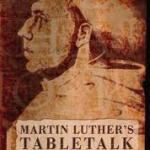Reading Reflection:

October 12, 2011
 Martin Luther’s Tabletalk, translated and edited by William Hazlitt, Esq. (Christian Heritage, reprinted 2003)
This is a great book (with a neat story behind it) that outlines Luther’s convictions freely given through conversation in the intimate relationships with his friends and disciples. As anyone fortunate enough to have dinner or go on a walk with Luther would do, they took notes. Those copious notes were finally translated and organized into this wonderful book. There is a whole section titled Of the Law and the Gospel. Sometimes we confuse the two—to our own detriment.
Martin Luther’s Tabletalk, translated and edited by William Hazlitt, Esq. (Christian Heritage, reprinted 2003)
This is a great book (with a neat story behind it) that outlines Luther’s convictions freely given through conversation in the intimate relationships with his friends and disciples. As anyone fortunate enough to have dinner or go on a walk with Luther would do, they took notes. Those copious notes were finally translated and organized into this wonderful book. There is a whole section titled Of the Law and the Gospel. Sometimes we confuse the two—to our own detriment.
Augustine pictured the strength, office, and operation of the law, by a very fit similitude, to show, that it discovers our sins, and God’s wrath against sin, and places them in our sight. ‘The law,’ says he, ‘is not in fault, but our evil and wicked nature; even as a heap of lime is still and quiet, until water be poured thereon, but then it begins to smoke and burn, not from the fault of the water, but from the nature and kind of the lime, which will not endure water; whereas, if oil, instead, be poured upon it, then it lies still, and burns not; even so it is with the law and the gospel’ (228).The law has a good purpose, but it cannot deliver us from our sin. Thankfully, God has sent His Son to do what the law could not. Jesus Christ fulfilled its demands. He took our just punishment for sin and now we are under grace. Most of us good little Christians know that the law cannot save us. But I think that we sometimes delusionally think that the law sanctifies us. Paul explains to in Romans chapter 7 that we must die to the law to be free for another, that is Jesus Christ. He actually used the illustration of marriage to show that the law has no authority over you after death. You can now be betrothed to another—the grace-giving Savior, Jesus Christ. In this, our salvation both fulfills the law and liberates us from its condemnation to live a truly righteous life in Christ. As James Mongomery Boice put it in his commentary of Romans, “The old husband is impotent.” Amen to that.




